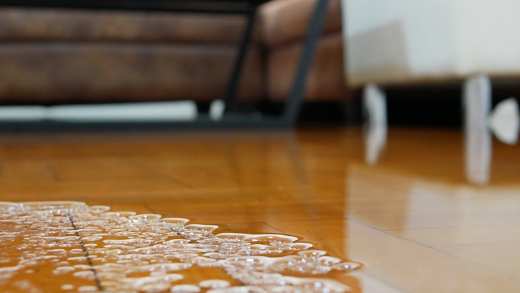Escape of water – how to protect your home
Water damage from plumbing, heating systems, or home appliances like washing machines can lead to insurance claims. But what exactly is covered when you file a claim?

The difference between flood and escape of water
When people see lots of water in their house, they might assume it’s a flood – but there’s a technical difference between flooding and escape of water in insurance terms. Flooding happens when the water comes into your house from an external source, like an overflowing river or a burst water main. Escape of water happens when the water comes from inside your house.
What may be covered
You can cover your buildings and/or contents for damage caused by water escaping from or freezing in water tanks, pipes, plumbed-in home appliances (such as washing machines and dishwashers), fixed equipment or fixed heating systems. There may not be cover included automatically for damage caused by water overflowing from sinks or baths, but you may be protected if you have accidental damage cover. You’ll have to pay an excess for escape and freezing of water claims. You should check your policy document for details of your excess(es).
With Aviva Buildings Insurance, we also cover:
- damage to fixed pipes, tanks, and equipment caused by water freezing in them
- costs to remove parts of the inside structure (like a wall) to find a hidden leak which has damaged your home. Once the leak has been found and fixed, we’ll pay to make good afterwards. The most we’ll pay for this with our standard Home cover is £5,000
- outbuildings and annexes which are part of the home
Exclusions and Limitations Apply. Please see your policy documents.
If you’re an Aviva Home Insurance customer and you have a leak, you should call us immediately on 0345 030 6945 Footnote [1] with your policy number to hand.
Please refer to your own home insurance documents to understand what is covered.
What may not be covered
If a leak is caused by a pipe that was damaged by wear and tear, you’ll likely be asked to pay to repair the pipe as wear and tear isn’t normally covered. However, the damage caused by the escaping water may be covered by your home insurance policy, depending on the specifics of your coverage.
Depending on your insurer, you’re probably not covered if water escapes from equipment which isn’t fixed – for example, if you drop a bucket of water, although this may be covered if you have accidental damage cover.
Please refer to your own home insurance documents to understand what is not covered.
How to prevent water damage
Fortunately, there are effective measures to prevent or minimise water damage:
- Check for cracked tiles, damaged or missing bath and shower sealant, and grout and replace them if needed
- Check for any visible signs of leaks, like damp patches or brown marks on ceilings.
- Don’t leave taps unattended when they’re running
- Lag pipes which are vulnerable to freezing (like those in the loft).
- Know where your stopcocks are, and test them so you know they’re working if you need to turn them off if there’s a leak
- Get a professional to fit a leak detection device which can monitor your water use and turn off the water if it suspects a leak
- If doing DIY, use a pipe detection device to check where pipes are before drilling into the wall
Most insurers, including Aviva, will expect you to take all reasonable steps to keep your property in good condition to avoid loss or damage. If you don’t, your insurer may not be able to pay part or all of your claim.



